At the end of Captain America: The First Avenger …
[SPOILER ALERT: technically, the next paragraph spoils the end of Captain America. However, it’s one of the better known parts of the Steve Rogers mythology, about as much of a spoiler as learning that Jon and Martha Kent aren’t really Clark Kent’s parents. Further, it sort of flows as a logical necessity in order to make Captain America a member of The Avengers in 2012, which everyone who’s followed the movie franchise knows he’ll be. So this is a very desultory spoiler alert. Merely due diligence. Ahem.]
… Steve Rogers, a/k/a Captain America, emerges from a frozen coma in the year 2011. Everyone he knew in the past is gone, Nick Fury tells him, including his love interest Peggy Carter.
“Wait a minute,” I thought upon seeing this. “Rogers was frozen for seventy years. Peggy might not be the arm candy she once was, but you could still have a conversation with her. She’d only be …”
And then I stopped. How old would Peggy Carter be in 2011?

Peggy Carter (played by Hayley Atwell) is a British officer with the Strategic Scientific Reserve. In 1941, most roles for women in the United Kingdom armed services were in an auxiliary corps. She could plausibly have been a member of the Women’s Royal Naval Service (also called “the Wrens”); this would be the most likely place that her talents for science, strategy and close quarters combat would be noticed.
Women could enlist in the Wrens as young as eighteen. Carter certainly doesn’t look eighteen, but she’s young enough to tote an automatic rifle and lead a squadron of commandos into action. So is she mid-twenties? Early thirties? Atwell herself would have been twenty-seven to twenty-eight at the time of filming.
This also raises the question of how old Steve Rogers is. Being a scrawny 95 pounds certainly makes him look younger than he is. He’s clearly fit enough to jog through Europe and pound some Nazi skulls. But he’s not a teenager. So is he fresh out of college? Does he have a day job? How old is the first Avenger?
At about this point I realized: it doesn’t matter exactly how old he is. Both Steve Rogers and Peggy Carter fit into that nebulous realm of “young, attractive adults” who star in most action flicks and romantic comedies. The exact chronology that CA:TFA requires is a fluke. It doesn’t matter whether Captain America is twenty-four or thirty-four. He’s young, hot and shirtless.
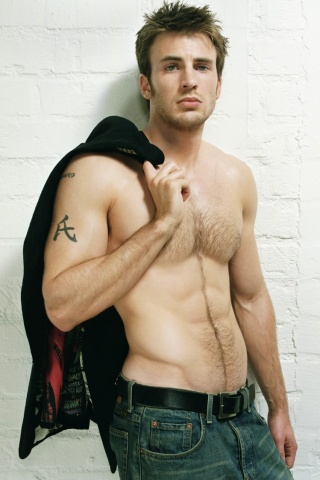
Don't ever say I didn't do nothing for ya.
From here I got to thinking further. Does age really matter in Hollywood? Being young or old matters for the type of roles you get, sure. But no one cares exactly how old you are. Every actor needs to be able to play a range. If James Van Der Beek can play a fifteen-year-old at age twenty (Dawon’s Creek), and Jessica Alba a world-renowned geneticist at twenty-four (Fantastic Four), then age is merely a broad bucket.
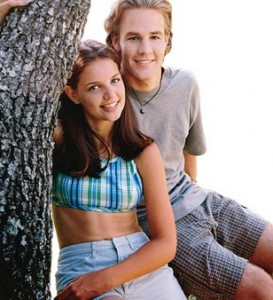
In Hollywood, it doesn’t matter how old you actually are. There are only five ages that matter.
1. THE ANNOYING CHILD
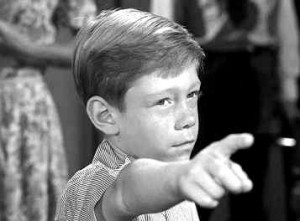
Prior to puberty, every child in Hollywood is annoying. That’s how they get cast. Children in Hollywood need to act out every impulse that comes into their heads. Cute kids need to be cloying; whiny kids need to be shrill. Kids rarely lead a movie, but when they do (see OTI favorite Unaccompanied Minors), they need to be a constant source of aggravation to adults.
Examples: Jonathan Lipnicki (Jerry Maguire), Jake Lloyd (The Phantom Menace), Haley Joel Osment (The Sixth Sense).
2. THE TEENAGER WITH ATTITUDE
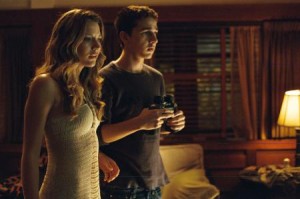
As soon as puberty sets in, all innocence vanishes. The teenager’s job is to impress themselves on the environment. This can be done through budding sexuality, anger at the hypocrisy of suburbia or frustration at being ignored by parents. Regardless, a teenager is never comfortable with their surroundings. Their allies are few, but their energy is limitless.
Examples: Michael Landon (I Was a Teenage Werewolf), Mark-Paul Gosselaar (Saved by the Bell), Blake Lively (Gossip Girl)
3. THE HOT YOUNG ADULT
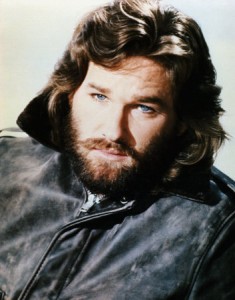
The hot young adult has fewer defining characteristics, besides being hot and young. They may be successful at their job or incompetent. They may have a steady relationship or may bounce from bed to bed. Whatever the case, the hot young adult is never settled. They have yet to enter a comfortable status quo – at least not one so comfortable that it can’t be shaken up by a sudden crisis. Often appears shirtless or without pants.
Examples: Robert de Niro (Taxi Driver), Faye Dunaway (Network), Harrison Ford (Raiders of the Lost Ark), Brad Pitt (Fight Club), Uma Thurman (Pulp Fiction)
4. THE TIRED PARENT
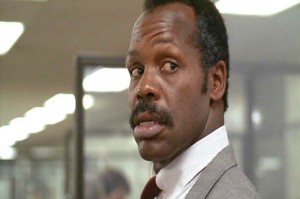
If an actor appears in a film with kids, regardless of their actual lifetime on this Earth, they enter another age bracket. A parent can still be young and they might still be attractive, but their youth and their ability to attract are no longer their defining characteristics. Now their lives are defined in relation to their family. They may still save the world, unite warring tribes and find true love, but they have to get home in time for dinner. They are anchored by other responsibilities. They can’t take off on the heroic journey by themselves.
Examples: Martin Lawrence (Bad Boys), John Travolta (Face/Off), Antonio Banderas (Spy Kids), Kevin James (Grown Ups)
5. THE CROTCHETY SENIOR
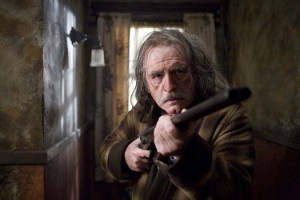
At the far end of the spectrum is the actor in their golden years. They’re no longer expected to run as fast or seduce the viewer. Now, like the teenager once again, their job is to impose their attitude by force. The world is no longer to their liking: full of loud music and loose mores and absent their childhood friends.
Examples: Diane Keaton (Something’s Gotta Give), Morgan Freeman (The Shawshank Redemption), Alec Guinness (Star Wars), Katherine Hepburn (The Lion in Winter)
When you’re an actor, no one cares how old you actually are. All the producers care about is which of the five ages you fit into. Angelina Jolie has played a sexy action star for over a decade, and Tom Cruise has managed it for nearly twenty-five years. It just takes a certain look and the right kind of agent.
Are there exceptions to this rule? Not really.
Comedy places less emphasis on the “hot young adult” role, but that’s because most comedians are (sorry guys) kind of homely. Every age can still participate in a comedy. You can have bratty kids (Unaccompanied Minors!), teenagers with attitude (Mean Girls), hot young adults (The Hangover), tired parents (Parenthood) or crotchety seniors (Grumpy Old Men).
And if you want to add some instant depth to your movie, just find actors who can plausibly cross over between two buckets! How about a bratty kid on the verge of pouty adolescence (Super 8)? Or a hot young adult who becomes a tired parent (Knocked Up)? Or a crotchety senior who somehow becomes a hot young adult (The Curious Case of Benjamin Button)? BAM – instant critical acclaim.
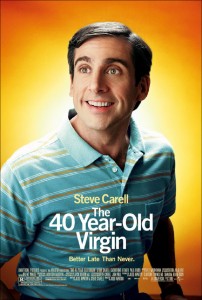
So, get this: he's old enough to be a parent, right? But he doesn't have a family. But - and get this - he's neither hot nor young! I KNOW, RIGHT?
Does Hollywood lose something by clumping ages together? Perhaps. An adult in her twenties has a different outlook on life than an adult in her thirties. She’s likely to tell different stories about herself. A father in his thirties reacts differently to his children than a father in his fifties. And if everyone north of fifty-five is a “senior citizen,” that’s a pretty depressing fate.
But by bracketing ages into quintiles, rather than decades or five-year stretches, Hollywood gives actors more opportunities to work. An actor is no longer limited to their exact age, but can play a range. This gives us the chance to see our favorite stars more often. And since star power is one of the big draws in any major motion picture, that can’t be all bad.
So try casting the actors in the next flick you see in their appropriate age brackets. Once you’ve bracketed every character, see if you can predict how their story turns out. Then brainstorm ways that this actor could break the mold.
And invest in Botox.
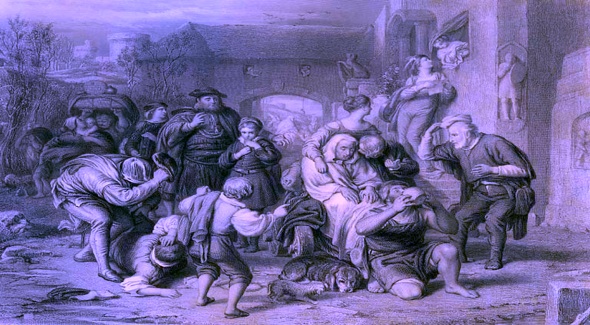
Having just finished my stint watching Boardwalk Empire, I couldn’t help but feel like that entire universe was one big pluralistic melting pot for ages. It’s entirely unclear just how old any of these people are. There does seem to be a ruling elite of moneyed “Grown-Ups” and and further tier of safari-baron elderly as seen through the commodore. The lowest rung would be a warring class of gangland muscle, and perhaps even beneath them a basement of incubating children.
However none of these people act their age or relegate themselves to there own group. Well-oiled debutantes exist at every level. In particular, one character’s mother looks as young as his wife. Pairing any two characters in the show with a eye for age gets totally lost. Is Nucky Thompson really older than Arnold Rothstien? Is Chalky the same age as Jimmy? Is Agent Van Alden older than his partner?
I suppose I could see a few reasons why a director might want to leave age somewhat ambiguous. In a world about how power can be traded, the influence of age could create dynamics that are not needed for the story. At the same time these dynamics are not unnoticed, even by the characters who in the first episode are partially motivated by this ambiguity to take on responsibility. Al Capone is especially transformed when he witnesses a 13 year old Jewish boy ascend to the rank of man within his community before him.
I suppose in nothing else, if you’re looking for a case study on the use of age and power Boardwalk Empire would be a good place to start.
I have to say, this piece seems more like an idea for an OTI piece than a fully realized one. Where is the statistical analysis? Shouldn’t you be able to cite, at least, actual ages for the actors during the filming of each of your exemplary roles?
I’d like to see some information about when the more durable actors and actresses pass from one category to another. When did de Niro bump from Stage 3 to Stage 5? Was there a Stage 4 period in his career?
Do the categories really work the same for men and for women? Is it even conceivable that January Jones is in Stage 4 and not Stage 3?
This needs more Overthinking.
It seems to me there’s an alternative to the Annoying Child – the Overly Precocious Kid. Think Hit Girl in Kick-Ass, Joseph Gordon-Levitt’s sister in 500 Days of Summer, or Nathan Fillion’s daughter in Castle. It’s usually a girl, and someone who’s wise/badass beyond their years. Everyone agrees that Hit Girl was the real protagonist of Kick-Ass, right? And who could call her annoying?
The Moretz-clause?
Perfect name for it, really, but in terms of the categorization, I think Chloe’s characters are more or less teenagers… who happen to not be teenagers yet.
Hard Eight plays with the age ranges in an interesting way. Samuel L. Jackson was 48 during filming- Tired Parent age, looking like a Hot Young Adult who behaves like a Teenager With Attitude, he conflicts with Philip Baker Hall (65) playing A Crotchey Senior trying to amend the damage he did as a Hot Young Adult to become a good Tired Parent to John C. Riley (31) and Gwyneth Paltrow (24), both Hot Young Adults.
The movie follows the age groups as you define them, just shows people in transition from one group to the other and plays with the concept. Like Samuel L. Jackson is suppose to be interpreted as in arrested development by being too old to play the certain age range he’s cast in. So it breaks the mold just to reaffirm it I guess, and shows that the ages are not absolutely linear.
You’ve missed a spot. Adult w/o kids. That’s a huge demographic that will go from just after HYA (when the Hot fades) to the CS. Eastwood exploited it well past the era of CS. Most action stars try to keep in the period as well, using fx when the body can’t handle the stresses that they once did during their HYA years.
Of course there will always be the lucky few that can disguise/ are genetically fortunate to stay in the HYA phase and not go into either TP or Aw/oK. Cruise typifies this as did M.J. Fox before he got the shakes.
Yeah I was thinking that too. Because Sam Jackson played almost the exact same character in Jackie Brown and as he did in Hard Eight which both came out the same year, the main difference was he was a self-acknowledged confident middle age man in Jackie Brown. Same with Pam Grier who was 48, wasn’t a parent or young, hot though. But mainly her character isn’t comfortable in her status quo, so I suppose that puts her in the HYA range.
But is that enough criteria to have a Adult w/out Kids group? I guess it is, the only difference between teens and seniors is age right? The only difference between a HYA and TP is having a kid. How does Juno enter into this without destroying the space-time continuum?
Instead of Aw/oK how about Generic Adult? The TP category is really a sideshow, just there because of cliches. Unless the cliches exist, the TP doesn’t embrace the rest of the field which is rather large. Where would you stick Bogie? He never played HYA and even by The African Queen he was still doing GA to Hepburn’s CS. He died before ever getting to CS.
Sometimes it’s just a look, Walter Brennan was a CS while in his mid forties. He hit that genre and never left it for 40 years. Burgess Meredith did the same thing. OTOH, Leslie Nielsen never got there. He was a CS playing TWA, especially after Airplane. You take a look at Eastwood, he was a HYA until post Rawhide then hit GA. He was there for decades until Absolute Power and even then played against genre by using CS as a ruse, presented it as a front while still being a GA.
The biggie is the fact all my examples are male. Most of the women go from HYA which they try to extend as much as they can to GA. Once there only a rare few will allow themselves to get to CS, the rest spending millions to try to disguise it or simply retiring before the fact. The Dench/Mirren/Streep’s of the world are special. And again genetics plays a large role here. Ask Catherine Bach or Val Kilmer.
This quintiling is especially hard on the ladies, who usually get bumped directly from hot young mom to Crotchety Senior.
For some reason, this made me think of “The Kids Are All Right”, where Annette Bening and Julianne Moore both play Tired Parents. But the plot of the movie hinges on Moore’s character pretending to be a Hot Young Adult, including the requisite sex scenes with fellow Hot Young Adult Mark Ruffalo – and then realizing that hot young adultness is not proper behavior for a Tired Parent. In real life, Moore is 50, and so she looks nearly miscast as a Tired Parent under 40, and way miscast during her Hot Young Adult phase. I don’t think this issue really detracted from the film that much, because it was well-covered by the acting, but it was interesting to think about.
Oddly enough, this does remind me of real life in one way: my days working retail in a liquor store. There’s basically “definitely underage (kick out of store),” “looks underage (check ID),” “most likely of age (but required to check ID anyway),” and “old and gray.”
That said, I admit that I’m a fairly unobservant viewer.
This covers protagonists well, but I think, on the villain end, there might be a category between Tired Parent and Crotchety Senior. Perhaps called “The Middle-Aged, Steely-Eyed Fascist” which encompasses villains who are not young, not old, and very power hungry and rules-oriented (their own rules, of course). Examples include Darth Vader, Trunchbull from Matilda, Patty Hewes from Damages.